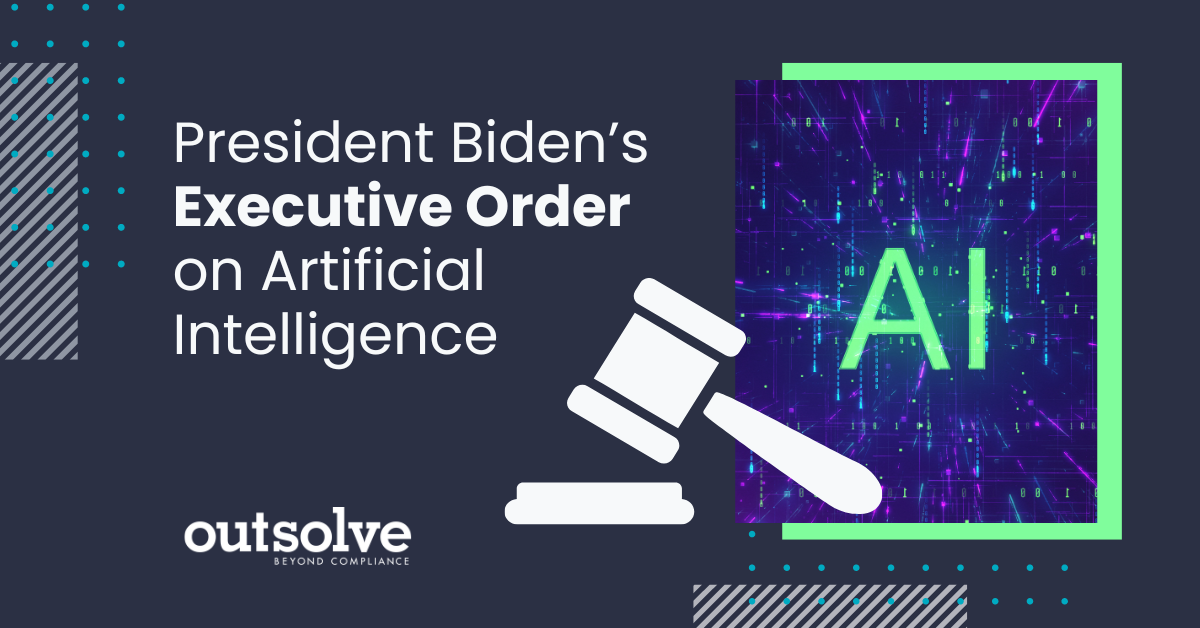3 min read
Navigating the Impact of President Biden's Executive Order on Artificial Intelligence
 Debra Milstein Gardner
:
Dec 14, 2023 10:15:00 AM
Debra Milstein Gardner
:
Dec 14, 2023 10:15:00 AM

On October 30, 2023, President Joe Biden's executive order (EO) on the Safe, Secure, and Trustworthy Development and Use of Artificial Intelligence (AI) set a new trajectory for the responsible implementation of AI technologies, particularly in the labor and employment sector. This groundbreaking directive represents a concerted effort to balance the transformative potential of AI with its inherent risks.
The EO emphasizes the importance of procedural and substantive safeguards in AI deployment. It acknowledges the dual nature of AI - its capacity to drive innovation and productivity on one hand, and its potential to cause harm, like discrimination and disinformation, on the other. The Biden administration aims to foster AI's development while implementing checks and balances to ensure ethical and secure usage.
Implications for Employers
The EO is especially pertinent for employers, focusing on areas such as immigration policy, civil rights, wage-and-hour compliance, and labor risks and opportunities. It outlines guiding principles for workplace AI, stressing the need for AI systems to be safe, secure, and not deployed in ways that could undermine worker rights or job quality. It ties this commitment to labor issues, indicating that as AI “creates new jobs and industries, all workers need a seat at the table, including through collective bargaining, to ensure that they benefit from these opportunities.”
The Department of Labor's (DOL) Role
The DOL has been tasked with creating the following, in consultation with other agencies and outside entities, including labor unions, and workers, within 180 days: (1) “a report analyzing the abilities of the agencies to support workers displaced by the adoption of AI and other technological advancements,” and (2) principles and best practices for employers to mitigate AI's potential harms and maximize benefits, focusing on job-displacement risks, the impact of job skills and evaluation of applicants and workers, labor standards, job quality, and the implications of AI-related data collection.
The DOL/Office of Federal Contracts Compliance Programs (OFCCP) is to publish guidance for federal contractors on non-discrimination in AI-driven hiring within a year. This initiative underscores the federal government's commitment to equitable and bias-free employment practices involving AI.

President Biden's Executive Order marks a significant step in the journey towards responsible AI usage in the labor and employment domain. Employers should be prepared for a continued collaborative effort among civil rights agencies in enforcing AI regulations. President Biden's AI Executive Order explicitly instructs civil rights law enforcement agencies to fully utilize their authority to tackle potential civil rights issues emanating from AI use, especially concerning AI and algorithmic bias. The order also mandates the Attorney General to assist and guide these agencies in applying existing federal laws to combat civil rights violations and discrimination stemming from AI. This directive includes coordination in developing investigation and prosecution best practices for AI-related civil rights violations, along with providing additional training and support across agencies. This initiative isn't novel but extends pre-existing efforts by agencies like the EEOC and OFCCP. For instance, in April 2023, the EEOC, the Civil Rights Division of the Department of Justice, the Consumer Financial Protection Bureau (CFPB), and the Federal Trade Commission (FTC) collectively issued a statement highlighting their jurisdiction over discrimination and bias in automated systems. The EEOC’s Strategic Enforcement Plan for 2024-2028, released in September 2023, reaffirmed its focus on combating discriminatory recruitment and hiring, particularly emphasizing the use of AI by employers. Similarly, the OFCCP has heightened its attention on AI technologies, evidenced by its updated audit scheduling letter in August 2023, which now includes a request for detailed information on AI and technology-based recruitment and hiring practices.
Given the EO's focus, employers, particularly federal contractors, should proactively review their AI usage, considering its impact on employees and preparing for forthcoming regulatory guidelines. The EO's alignment with the Biden administration's "Blueprint for an AI Bill of Rights" and existing EEOC guidance indicates a trend towards more stringent AI regulations in employment.
We expect that the best practices tools to be created by the OFCCP will look like the technical assistance guidance issued by the EEOC.
As addressed in previous OutSolve blogs, the OFCCP is keenly interested in the use of AI and other automated systems or technology-based selection procedures when making employment decisions. See these blogs here:
-
NILG Overview Series: Artificial Intelligence and the Hiring Process
-
EEOC Issues Guidance on Employers Use of AI and Disparate Impact Potential
OutSolve stands ready to support you in the development of a strategy to manage these requirements. Please contact us to discuss your plans.
Debra Milstein Gardner has worked in the Equal Employment Opportunity (EEO) and Affirmative Action (AA) space for the past 43 years while working in the public and private sectors in various human resources compliance roles. She began her career working for the Equal Employment Opportunity Commission and then went to the Marriott Corporation for nine years working in EEO, Affirmative Action and field human resource roles. In 1990, Debra founded Workplace Dynamics LLC providing EEO, AA, and DEI consulting services to government contractors. In 2016, Debra sold the affirmative action portion of Workplace Dynamics to OutSolve LLC and works part-time as a Market Analyst. Debra is a sports fanatic, routing for the Baltimore Ravens and all Virginia Tech Hokie teams. She loves to hike and boat in her mountain and lake community of Lake Lure, NC.
Weekly OutLook
Featured Posts

5 Key Compliance Items HR Can’t Afford to Ignore

HR Compliance Checklist: What Every HR Pro Needs to Know
Related Posts

What Texas HB 149 Means for HR Professionals
AI is already changing how companies hire, manage, and evaluate employees in the workplace. For HR professionals, AI is a game changer because it can...

New Jersey Pay Transparency Laws: What You Need to Know
Update: New Jersey proposed updates to its pay transparency law in October 2025. If passed, the requirements will be a first of its kind in that...

Legal Series: Top 4 HR Compliance Trends to Watch in 2026
This article is part of an ongoing legal series designed to provide insight and practical guidance on current and emerging workplace compliance...
